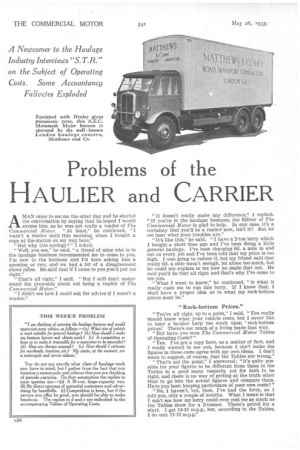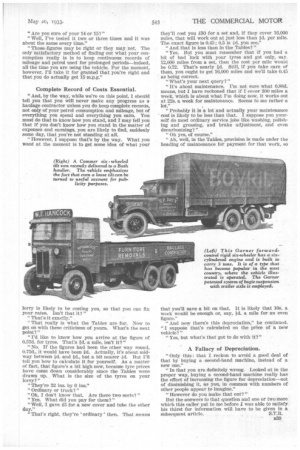Problems of the
Page 52

Page 53

If you've noticed an error in this article please click here to report it so we can fix it.
HAULIER and CARRIER
A Newcomer to the Haulage Industry Interviews " S .T. R. on the Subject of Operating Costs, Some Accountancy
Fat/odes Exploded AMAN came to see me the other day and he started the conversation by saying that he hoped I would excuse him, as he was not really a reader of The Commercial Motor. "At least," he continued, "I wasn't a reader until this morning, when I bought a copy at the station on ray way here."
"But why this apology?" I asked.
"Well, you see," he said, "a friend of mine who is in the haulage business recommended me to come to you. I'm new to the business and I'd been asking him a question or two, and we had a bit of a disagreement about rates. He said that if I came to you you'd put me right."
"That's all right," I said. "But I still don't understand the preamble about not being a reader of The Commercial Motor."
"I didn't see how I could ask for advice if I wasn't a reader." "It doesn't really make any difference," I replied. "If you're in the haulage business, the Editor of The Commercial Motor is glad to help. In any case, it's a certainty that you'll be a reader now, isn't it? But let me hear what your troubles are."
"It's like this," he said. "I have a 2-ton lorry which I bought a short time ago and I've been doing a little general haulage. I've been charging 6d. a mile in and out on every job and I've been told that my price is too high. I was going to reduce it, but my friend said that really 6d. a mile wasn't enough, let alone too much, but he could not explain to me how he made that out. He said you'd do that all right and that's why I've come to see you. "What I want to know," he continued, "is what it really costs me to run this lorry. If I know that, I shall have a proper idea as to what my rock-bottom prices must be."
"Rock-bottom Prices."
"You're all right up to a point," I said. "You really should know what your vehicle costs, but I never like to hear a haulier harp too much upon 'rock-bottom prices.' There's not much of a living made that way.
"But have you seen The Commercial Motor Tables of Operating Costs?"
"Yes. I've got a copy here, as a matter of fact, and I really wanted to see you, because I can't make the figures in those costs agree with my own ideas. I don't mean to suggest, of course, that the Tables are wrong."
"That's not the point," I answered ; "it's quite possible for your figures to be different from those in the Tables in a good many respects, yet for both to be right, and there is no way of getting at the truth other than to go into the actual figures and compare them. Have you been keeping particulars of your own costs?"
"No, I haven't, but, then, I've had the lorry, as I told you, only a couple of months. What I mean is that I can't see how my lorry could ever cost me as much as the Tables show for a 2-tonner. There's petrol for a start. I get 14-15 m.p.g., but, according to the Tables, I do only 11-12 m.p.g."
"Are you sure of your 14 or 15?"
" Well, I've tested it two or three times and it was about the same every time."
"Those figures may be right or they may not. The only satisfactory method of finding out what your consumption really is is to keep continuous records of mileage and petrol used for prolonged periods—indeed, all the time you are using the vehicle. For the moment, however, I'll take it for granted that you're right and that you do actually get 15 m.p.g."
Complete Record of Costs Essential.
"And, by the way, while we're on this point, I should tell you that you will never make any progress as a haulage contractor unless you do keep complete records, not only of your petrol consumption and mileage, but of everything you spend and everything you earn. You must do that to know how you stand, and I may fell you that if you don't'know how you stand in the matter of expenses and earnings, you are likely to find, suddenly some day, that you're not standing at all.
"However, I suppose that's by the way. What you want at the moment is to get some idea of what your
lorry is likely to he costing you, so that you can fix your rates. Isn't that it?"
"That's it exactly."
"That really is what the Tables are for. Now to get on with these criticisms of yours. What's the next point?"
"I'd like to know how you arrive at the figure of 0.57d. for tyres. That's id. a mile, isn't it?"
"No. If the figures had been the other way round, 0..75d., it would have been /d. Actually, it's about midway between id. and id., but a bit nearer id. But tell you how to calculate it for yourself. As a matter of fact, that figure's a bit high now, because tyre prices have come dawn considerably since the Tables were drawn up. What is the size of the tyres on your lorry?"
"They're ,32 ins. by 6 ins."
"Ordinary or truck?"
"Oh, I don't know that. Are there two sorts?" "Yes. What did you pay for them?"
"Well, 1 gave £5 for a new cover and tube the other day."
"That's right, they're ' ordinary ' then. That means they'll cost you £30 for a set and, if they cover 16,000 miles, that will work out at just less than id. per mile. The exact figure is 0.45; 0.5 is id. you see."
"And that is less than in the Tables?"
"Yes. But you must remember that if you had a bit of bad luck with your tyres and got only, say. 12,000 miles from a set, then the cost per mile would be 0.72. That's nearly id. Still, if you take care of them, you ought to get 16,000 miles and we'll take 0.45 as being correct.
"What's your next query?"
"It's about maintenance. I'm not sure what 0.88d. means, but I have reckoned that if I cover 300 miles a week, which is about what I'm doing now, it works out at 22s. a week for maintenance. Seems to me rather a lot."
'Probably it is a lot and actually your maintenance cost is likely to be less than that. I suppose you yourself do most ordinary service jobs like washing, polishing and greasing, and brake adjustment, and even decarbonizing?"
"Oh yes, of course."
" Ah, well, in the Tables, provision is made under the heading of maintenance for payment for that work, so that you'll save a bit on that. It is likely that 10s, a week would be enough or, say, id. a mile for an even figure."
"And now there's this depreciation," he continued. "I suppoSe that's calculated on the price of 'a new vehicle?"
"Yes, but what's that got to do with it?"
A Fallacy of Depreciation.
"Only this: that I reckon to avoid a good deal of that by buying a second-hand machine, instead of a new one."
"In that you are definitely wrong. Looked at in the proper way, buying a second-hand machine really has the effect of increasing the figure for depreciation—not of diminishing it, as you, in common with numbers of other people appear to imagine."
"However do ,rou Make that out?"
But the answers to that question and one or two more which this caller put to me before I was able to satisfy; his thirst for information will have to be given in a.
subsequent article. S.T.R.




























































































